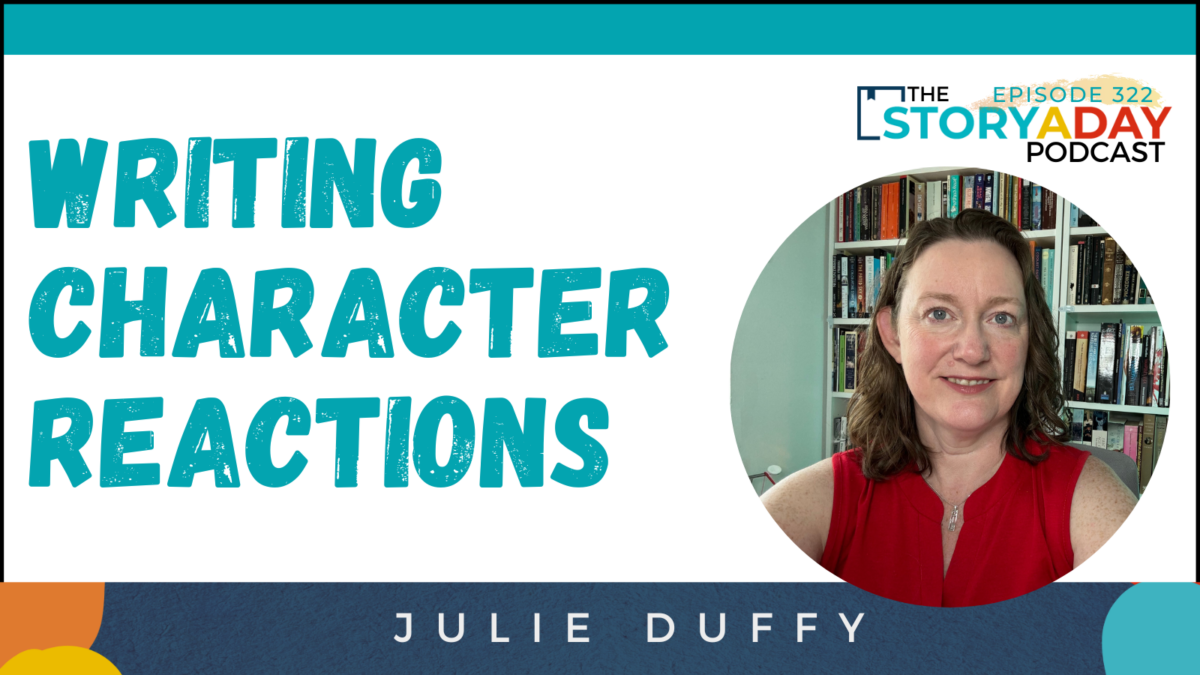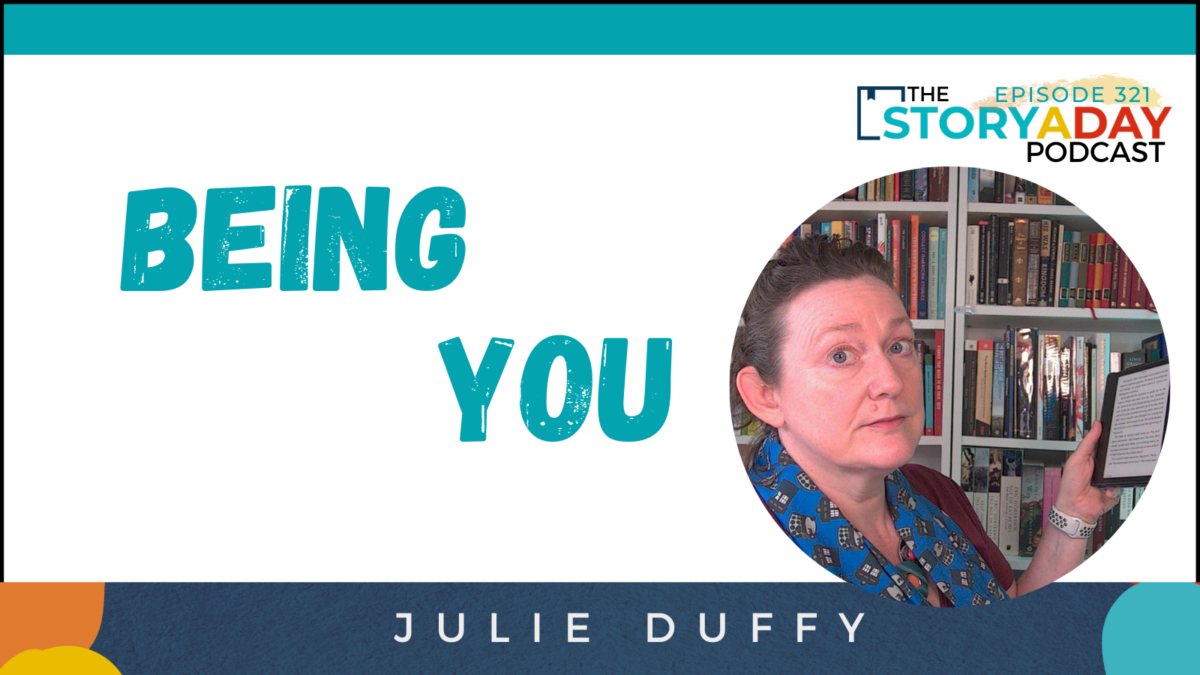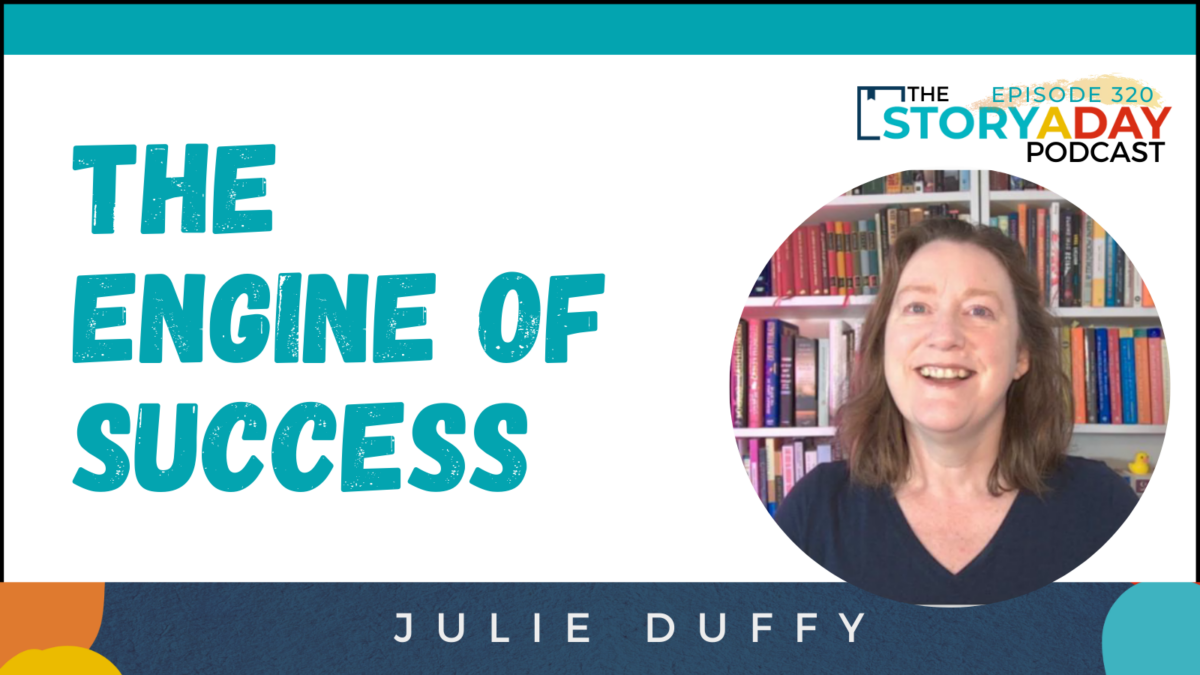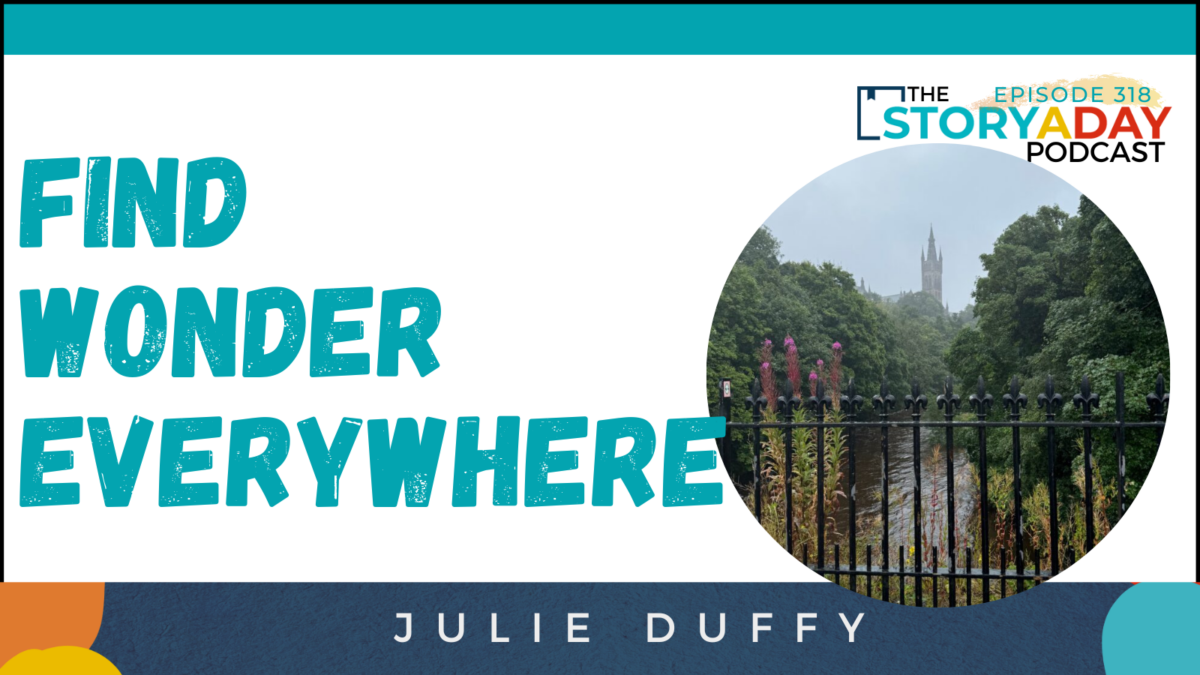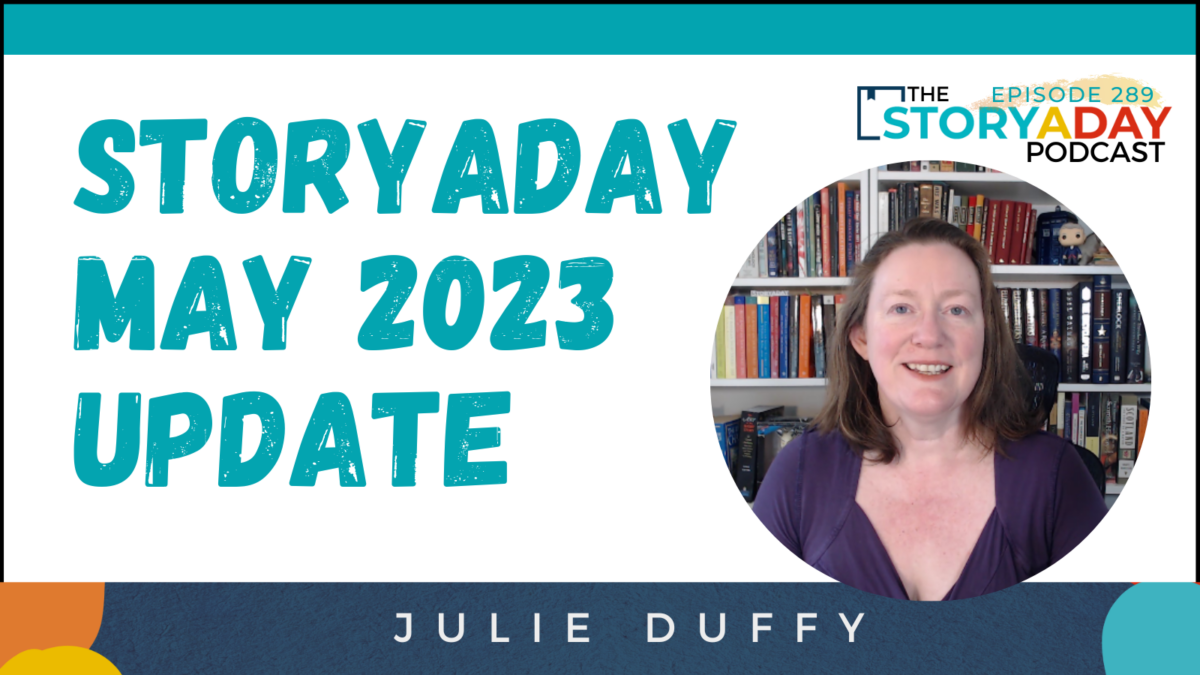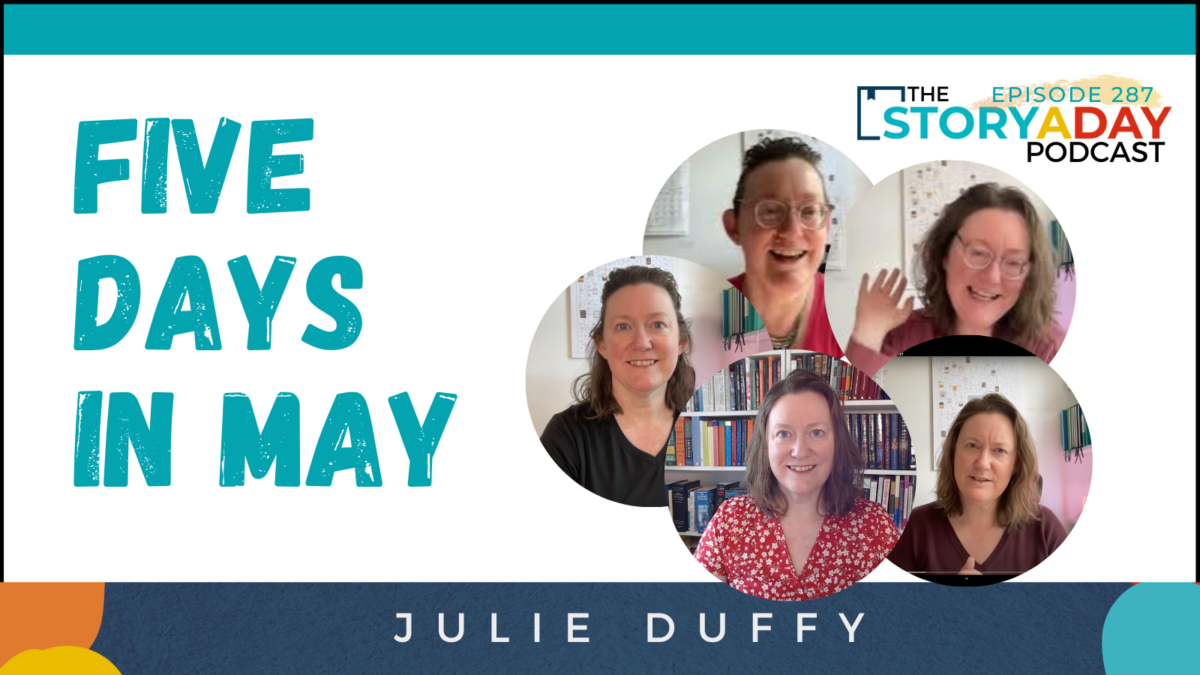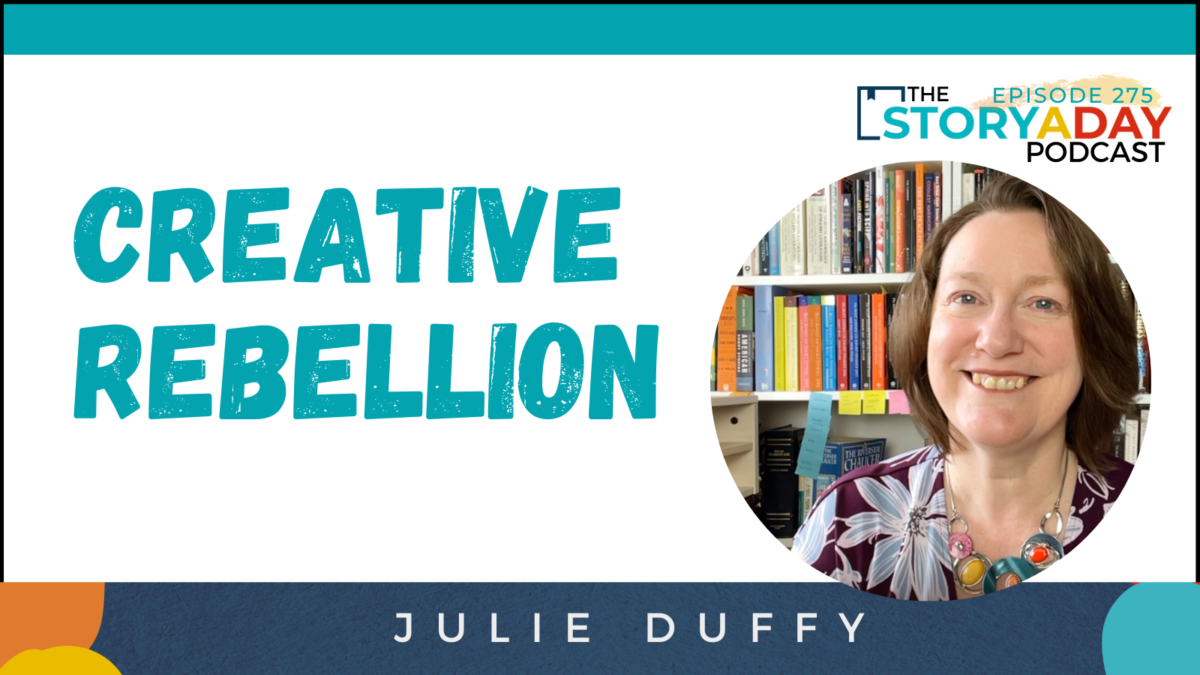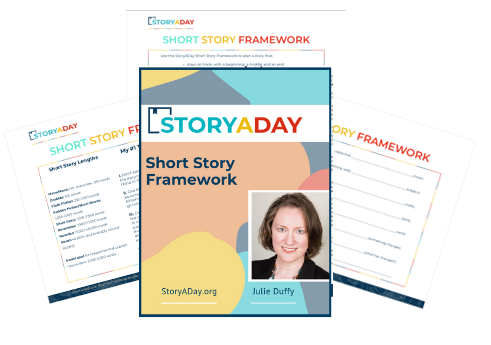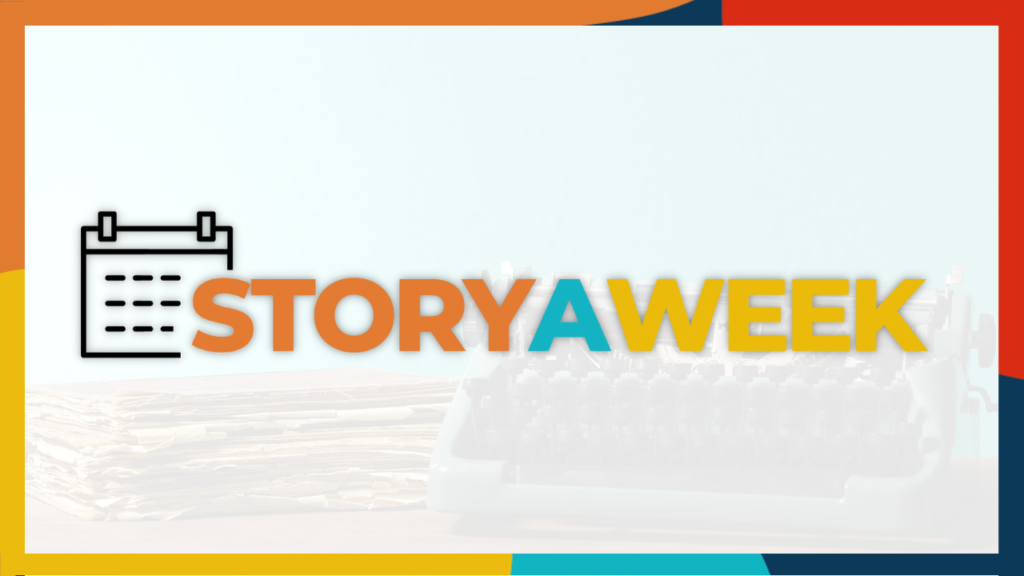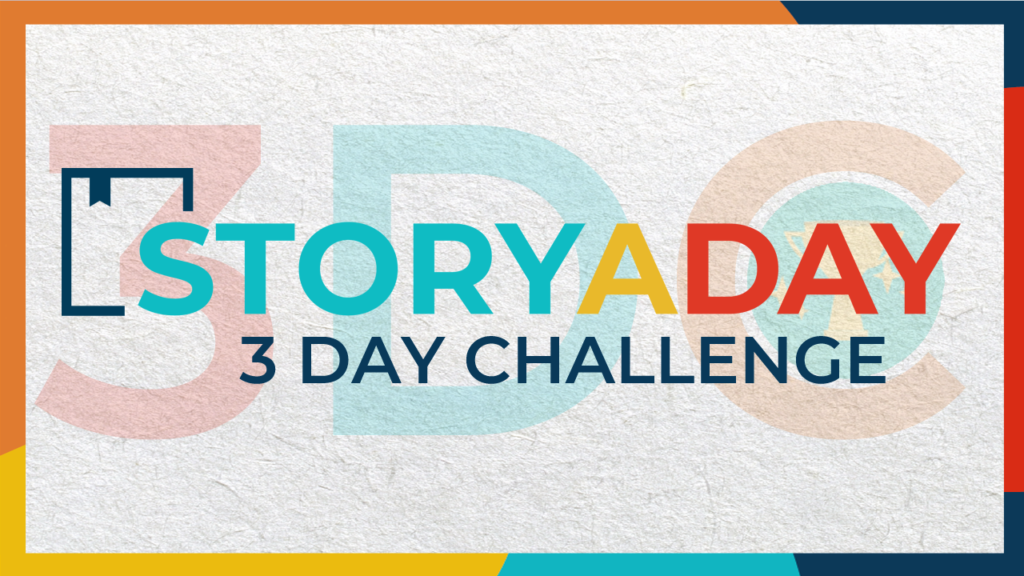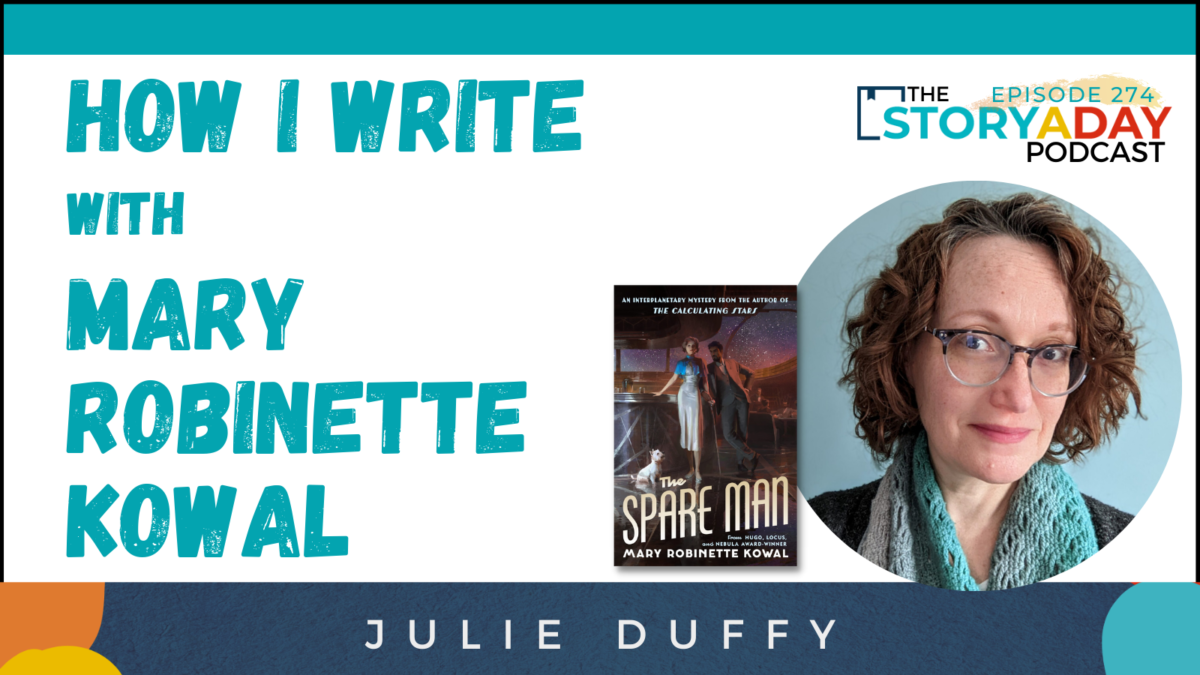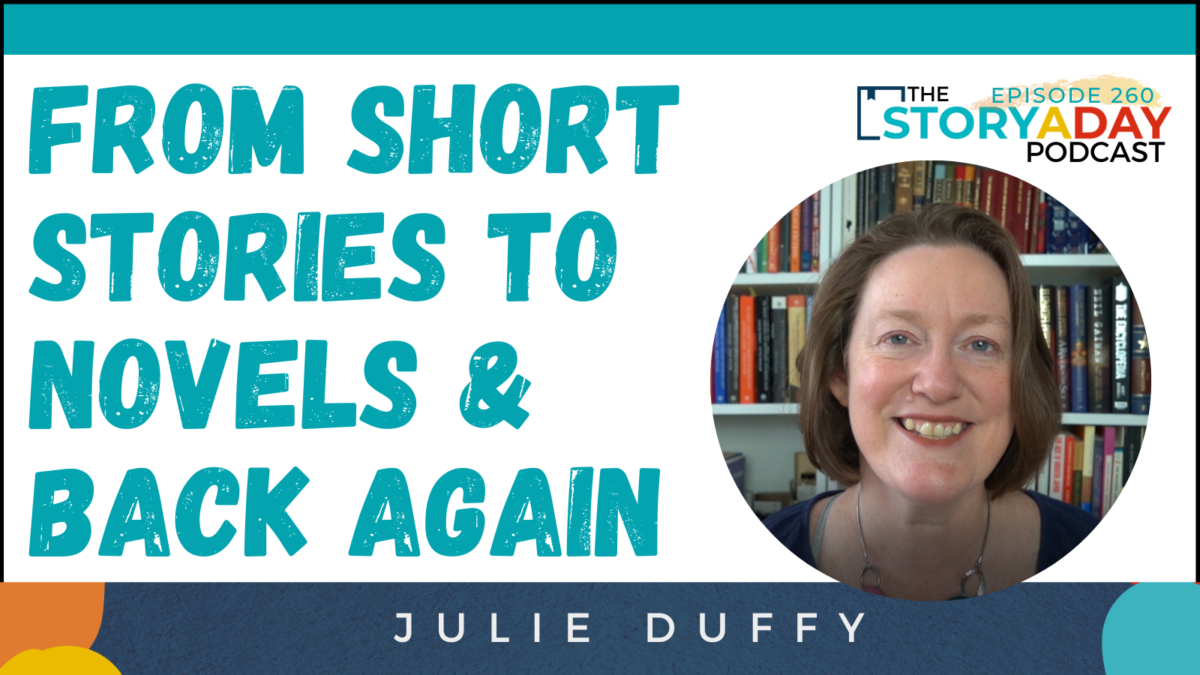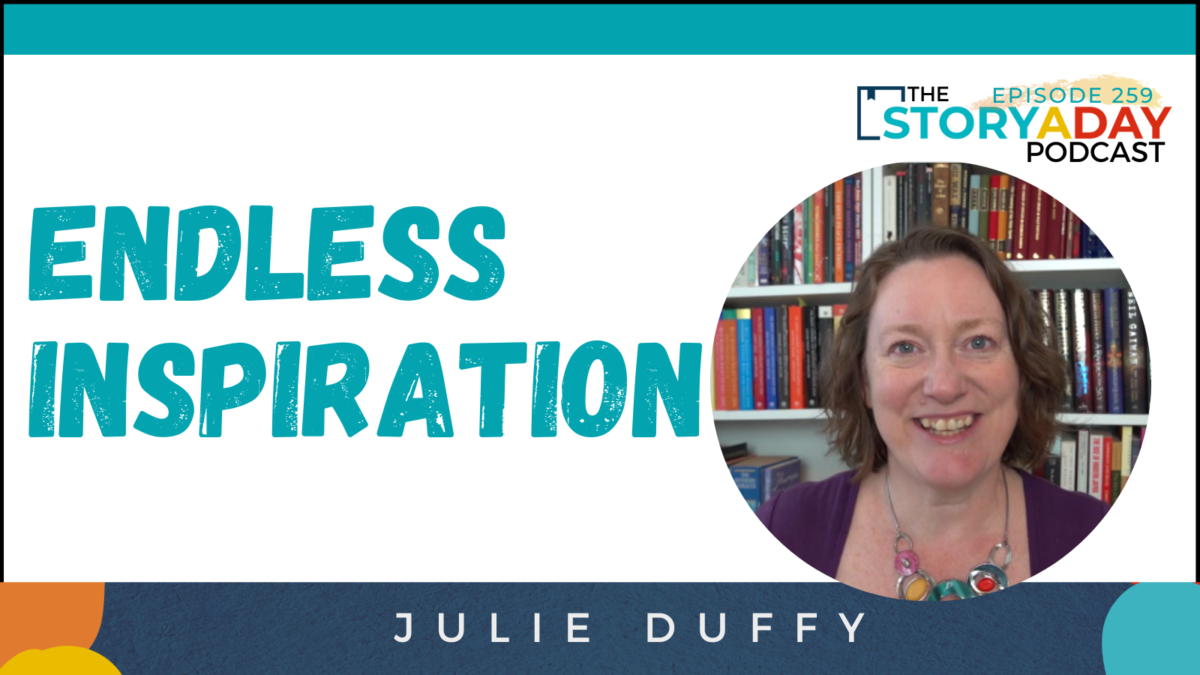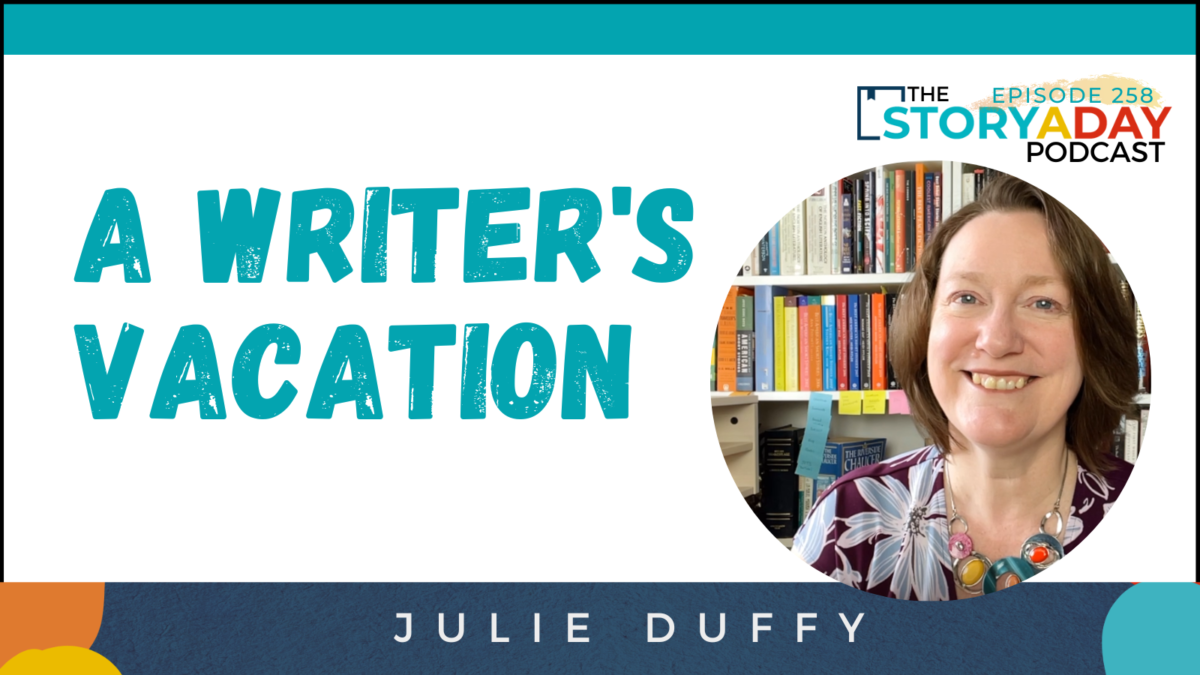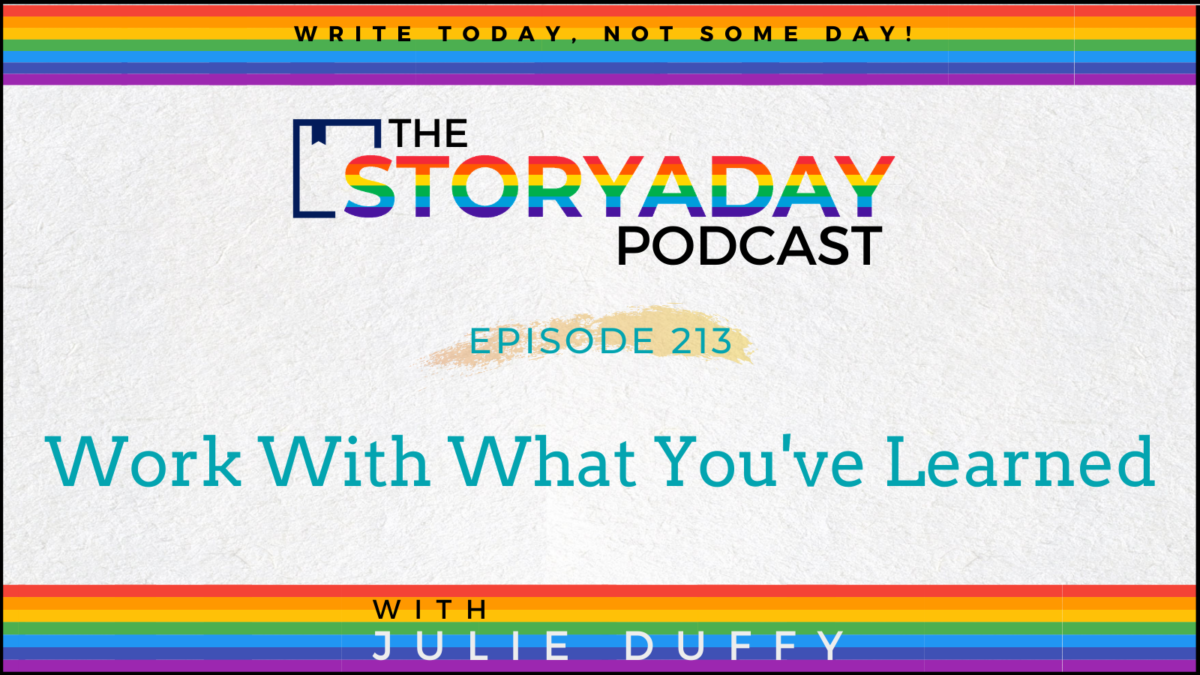How to write realistic, fascinating character reactions…and what that can teach you about BEING a writer…
LINKS: One-Story Challenge: https://storyaday.org/one-story-signup
Watch on YouTube
Other Help for Improving Your Writing Life
Download the Short Story Framework:
Take the 3-Day Challenge
Sign up for the StoryAWeek Newsletter
Take the I, WRITER Course
Join the Superstars Group
https://storyaday.org/superstars
Coaching with Julie
Transcript
1
00:00:01,149 –> 00:00:02,950
Good morning, good
evening, good afternoon.
2
00:00:02,950 –> 00:00:06,870
Julie here from Story a Day and I am
here this week to talk to you about
3
00:00:06,870 –> 00:00:10,609
some other things that I’ve been
discovering working through the One
4
00:00:10,619 –> 00:00:14,779
Story September Challenge with the
current group of people going through it.
5
00:00:15,290 –> 00:00:25,349
Last week we were talking about how
characters react to various stimuli and
6
00:00:25,349 –> 00:00:30,974
so I was sharing the the things I’ve
learned in my study of the psychology
7
00:00:30,974 –> 00:00:33,155
of the human being, the human creature.
8
00:00:33,705 –> 00:00:39,864
And one of the things that’s
really striking is that we are
9
00:00:39,864 –> 00:00:43,694
not as evolved as we think we are.
10
00:00:44,594 –> 00:00:48,705
So if you’ve been struggling, if
you’re interested in how to write
11
00:00:48,794 –> 00:00:51,285
better characters, I’m going to
talk a little bit about that today.
12
00:00:51,625 –> 00:00:55,754
And I’m also going to talk about
how we can use that knowledge.
13
00:00:56,400 –> 00:01:02,459
to help ourselves to escape from
the prison of imposter syndrome or
14
00:01:02,459 –> 00:01:10,140
procrastination or lack of motivation or
starting things and not finishing them.
15
00:01:10,150 –> 00:01:13,230
All of these complaints that I hear
from people every time I put out
16
00:01:13,230 –> 00:01:16,180
a survey that asks you what’s, uh,
what you’re struggling with right
17
00:01:16,180 –> 00:01:22,880
now or any time basically I talk to
writers or, uh, be a writer myself.
18
00:01:23,369 –> 00:01:28,145
So First, let’s talk about
characters, because it’s easier to
19
00:01:28,145 –> 00:01:33,884
talk about other people, especially
non existent people, than it is to
20
00:01:34,074 –> 00:01:37,074
examine our deep, dark, inner selves.
21
00:01:38,455 –> 00:01:40,035
Here’s how humans operate.
22
00:01:40,614 –> 00:01:45,324
When something happens,
we react instinctively.
23
00:01:45,974 –> 00:01:50,404
We react chemically, actually.
24
00:01:50,404 –> 00:01:50,574
We react chemically.
25
00:01:51,215 –> 00:01:59,355
Our body floods itself with whatever
chemicals in our, our history of human
26
00:01:59,365 –> 00:02:01,615
existence has taught us is important.
27
00:02:01,995 –> 00:02:04,925
This is what we’re talking about when
we say we have the fight or flight
28
00:02:04,945 –> 00:02:09,024
response or how, you know, your
body thinks it’s going to, if you’re
29
00:02:09,034 –> 00:02:12,394
stressed, it’s like in olden days when
you used to think you were going to
30
00:02:12,394 –> 00:02:14,024
get eaten by a saber toothed tiger.
31
00:02:14,584 –> 00:02:17,614
Uh, actually humans are a lot
older than saber toothed tigers.
32
00:02:22,925 –> 00:02:25,575
And so you’ve heard those things
too, so many times that they
33
00:02:25,575 –> 00:02:26,965
just kind of wash over you now.
34
00:02:27,005 –> 00:02:31,555
But I want you to think about the
fact that we react instinctively.
35
00:02:33,374 –> 00:02:38,014
And our bodies flood us, flood us with
the chemicals that it thinks we’re
36
00:02:38,014 –> 00:02:44,255
going to need before any rational
thought has time to form in our brains.
37
00:02:44,894 –> 00:02:46,714
That’s how your characters react.
38
00:02:47,575 –> 00:02:55,025
And because we are writing something
that is potentially quite intimate
39
00:02:55,085 –> 00:03:00,355
with our characters, we can hop into
their heads, we can hop into their
40
00:03:00,365 –> 00:03:05,959
bodies at any point, and we should be
sharing that stuff with the reader.
41
00:03:06,410 –> 00:03:11,380
The reader doesn’t really want to know
just what’s happening on the external.
42
00:03:11,780 –> 00:03:14,710
They want to know what’s
happening inside the character.
43
00:03:14,980 –> 00:03:18,740
We all consume a lot of television
and movies, I’m going to assume.
44
00:03:20,170 –> 00:03:24,790
That, in the hands of a really good actor
and a really good director, sometimes
45
00:03:24,790 –> 00:03:26,410
you get some of that inner journey.
46
00:03:26,750 –> 00:03:30,750
You see a range of emotions
flicker over the protagonist’s face
47
00:03:30,750 –> 00:03:32,140
before they do the right thing.
48
00:03:33,410 –> 00:03:37,470
What’s happening, and what’s happened
with that actor and director is probably
49
00:03:37,480 –> 00:03:42,419
lots and lots of conversations about
exactly how the character wants to react
50
00:03:42,450 –> 00:03:47,099
and what they’re doing to suppress that
initial desire, and whether they’re
51
00:03:47,099 –> 00:03:48,759
going to give in to that initial desire.
52
00:03:49,019 –> 00:03:51,840
And the fact is, that’s what’s
happening in every person all
53
00:03:51,840 –> 00:03:53,070
the time when something happens.
54
00:03:53,420 –> 00:03:59,070
We have this instinctive
reaction, and then we have the
55
00:03:59,070 –> 00:04:00,499
conditioned response response.
56
00:04:02,190 –> 00:04:08,180
And the Conditioned Response, the first
response that we consciously have,
57
00:04:08,450 –> 00:04:14,450
even subconsciously, is the Conditioned
Response from when you were a kid, and
58
00:04:14,830 –> 00:04:19,430
what the people who raised you, and the
people around you, who mattered to you,
59
00:04:19,699 –> 00:04:26,709
taught you, was an acceptable solution to
a situation, or reaction to a situation.
60
00:04:28,145 –> 00:04:30,805
So, if you grew up in
a house that was very
61
00:04:34,515 –> 00:04:42,044
ebullient, whether that’s for good or
ill, if people, if your character comes
62
00:04:42,044 –> 00:04:45,314
from, say, an Italian American family,
where everybody argues and shouts and
63
00:04:45,314 –> 00:04:50,265
then it all blows over in a few minutes,
as I am led to believe, then that’s going
64
00:04:50,265 –> 00:04:53,619
to be how they think it’s okay to react.
65
00:04:53,960 –> 00:04:58,049
And that’s going to be the first
reaction they reach for beyond
66
00:04:58,059 –> 00:05:00,679
the fight or flight reaction.
67
00:05:01,609 –> 00:05:08,449
Um, the, the urge to punch
someone is fairly deeply buried.
68
00:05:08,450 –> 00:05:12,890
When somebody crosses you, the urge to
like, if they come at you physically,
69
00:05:12,890 –> 00:05:19,319
the urge to come back at them physically
is fairly deeply in us instinctually.
70
00:05:20,410 –> 00:05:24,790
Your childhood will have taught you
whether or not it’s acceptable to
71
00:05:24,790 –> 00:05:30,999
let that instinct go or whether you
need to, like, sit on your hands.
72
00:05:33,375 –> 00:05:38,095
Beyond that, as you, as your character
lives through life and goes outside
73
00:05:38,095 –> 00:05:42,555
the world of their family, their, their
childhood environment, they’re going
74
00:05:42,555 –> 00:05:46,805
to be in other environments where they
will learn other ways of being, and
75
00:05:46,805 –> 00:05:48,974
they will learn other societal norms.
76
00:05:48,974 –> 00:05:53,955
When you go to school, it’s very much not
okay to punch someone when you’re in the
77
00:05:53,955 –> 00:05:57,075
classroom, even though in certain eras
and certain places it might still have
78
00:05:57,075 –> 00:05:58,665
been fine to scrap on the playground.
79
00:05:59,725 –> 00:06:06,415
So you have to learn, as a human
being, to suppress instincts in layers.
80
00:06:07,745 –> 00:06:11,725
As you become, say, this character
who we’ve talked about comes
81
00:06:11,725 –> 00:06:15,155
from a very voluble, very, very
volatile family, where it might have
82
00:06:15,155 –> 00:06:16,535
been okay to punch your brother.
83
00:06:17,044 –> 00:06:20,005
And then they go to school and discover
it’s okay to punch them, but only on the,
84
00:06:20,175 –> 00:06:23,315
on the playground when nobody’s looking,
certainly not in front of a teacher,
85
00:06:23,485 –> 00:06:24,895
and certainly not in the classroom.
86
00:06:25,634 –> 00:06:28,325
Then they grow up and
they become a lawyer.
87
00:06:29,010 –> 00:06:31,930
for people who may still do the punching.
88
00:06:32,250 –> 00:06:37,680
But the lawyer themselves has to
have these layers of civility and
89
00:06:37,680 –> 00:06:42,390
refinement, which they, they drape
over everything that they learned.
90
00:06:42,939 –> 00:06:47,460
And so if you’re writing this character,
they’re probably not punching anyone
91
00:06:47,470 –> 00:06:51,690
anymore, except in very extreme
circumstances in very dark alleys.
92
00:06:53,070 –> 00:06:58,030
Which means that in a situation of
high stress when someone comes at
93
00:06:58,030 –> 00:07:04,340
your lawyer verbally they are going to
react with that primal urge to punch.
94
00:07:05,439 –> 00:07:10,239
The little kid in them is
going to want to punch.
95
00:07:11,479 –> 00:07:17,290
The kid who went through school and
who’s learned to suppress that urge
96
00:07:17,330 –> 00:07:20,370
until nobody’s looking might kick in.
97
00:07:21,055 –> 00:07:27,225
And then the kid who went through law
school and learned to suppress all
98
00:07:27,225 –> 00:07:33,685
of that and come at them verbally is
going to kick in, maybe, on their best
99
00:07:33,685 –> 00:07:35,524
day, in the best of circumstances.
100
00:07:36,105 –> 00:07:37,984
So that’s a lot of emotion.
101
00:07:38,244 –> 00:07:41,725
Those are a lot of stages
that your character is going
102
00:07:41,915 –> 00:07:44,485
to go through in an instant.
103
00:07:45,085 –> 00:07:49,725
That’s how the human mind
brain nervous system works.
104
00:07:50,555 –> 00:07:55,045
If you’re not showing us any of
that, how are we supposed to know
105
00:07:55,045 –> 00:07:56,165
what your character’s going through?
106
00:07:56,715 –> 00:08:04,074
If they just quirk an eyebrow or smirk,
what does that tell us about what’s
107
00:08:04,075 –> 00:08:06,875
actually happening inside your character?
108
00:08:07,164 –> 00:08:14,565
You’ve got, uh, you’ve got like a
five minute slow mo sequence that you
109
00:08:14,615 –> 00:08:21,330
could be running through You’ve got
all the off ramps on that journey.
110
00:08:22,080 –> 00:08:27,330
Your character can go all the way
to the right civilised response and
111
00:08:27,690 –> 00:08:30,070
come back with a witty rejoinder.
112
00:08:30,850 –> 00:08:36,340
Or they can take an earlier off ramp
and they can snarl or they can lash
113
00:08:36,340 –> 00:08:39,829
out or they can, you know, have some
physical reaction that shows them
114
00:08:39,829 –> 00:08:43,840
wanting to go at the other person and
repressing it because, you know, school.
115
00:08:44,280 –> 00:08:45,499
Or you can let them.
116
00:08:45,780 –> 00:08:49,560
Rip and you can let them have their
primitive reaction not even the one
117
00:08:49,560 –> 00:08:52,580
in the family where somebody would
have stepped in and said Okay kids,
118
00:08:52,580 –> 00:08:53,849
let’s you know, let’s break it up.
119
00:08:53,849 –> 00:08:54,049
Now.
120
00:08:54,360 –> 00:08:57,990
You could let them go even further
You have all of those things to
121
00:08:57,990 –> 00:09:01,780
go through emotionally inside your
character Before you even start
122
00:09:01,789 –> 00:09:05,090
thinking about how to show that on the
outside and how far they’re gonna go.
123
00:09:05,520 –> 00:09:10,564
So We go from a very primitive response
to a conditioned response that can be
124
00:09:10,564 –> 00:09:18,304
hard to get over to the civilized response
that we have layered on as adults that
125
00:09:18,314 –> 00:09:23,824
makes the, the, the actions that we
think are civilized and acceptable.
126
00:09:24,594 –> 00:09:29,025
Part of the journey throughout a story
for your character, part of the internal
127
00:09:29,025 –> 00:09:33,914
journey of any character, is probably
going to always be a balance between
128
00:09:34,295 –> 00:09:42,444
what society will accept as civilized and
what your character really wants to do.
129
00:09:43,334 –> 00:09:49,234
It’s probably a journey between, journey
about, or a balancing act about them
130
00:09:51,365 –> 00:09:57,975
overcoming their instincts and deciding
how far to go towards what society
131
00:09:57,975 –> 00:10:02,485
wants and what feels good in the moment.
132
00:10:03,540 –> 00:10:07,450
And then, of course, you get to
explore things like the conditioning
133
00:10:07,450 –> 00:10:11,299
that your character has laid over
themselves, both by their family and
134
00:10:11,300 –> 00:10:12,670
their school and their environment.
135
00:10:12,899 –> 00:10:17,039
All of these things, all of these, these,
all of this conditioning that has happened
136
00:10:17,090 –> 00:10:22,469
to them, along with the things that they
have decided to take on in order to fit
137
00:10:22,469 –> 00:10:25,850
into the world they’re in, some of that
stuff may need to be stripped away.
138
00:10:26,450 –> 00:10:30,630
You think about a romantic partner
who’s experiencing coercive control.
139
00:10:30,950 –> 00:10:34,870
They have learned all these layers of
conditioning that have kept them safe and
140
00:10:34,870 –> 00:10:36,700
some of that stuff they shouldn’t have.
141
00:10:37,330 –> 00:10:39,219
And they’re going to have
to strip that stuff away.
142
00:10:39,420 –> 00:10:44,580
And it’s always going to be a fight
between the instinct, the conditioning,
143
00:10:45,740 –> 00:10:52,010
the intellectual decision about
what’s acceptable, and then perhaps
144
00:10:52,010 –> 00:10:54,120
a further intellectual decision.
145
00:10:54,525 –> 00:10:59,965
decision about what’s acceptable now,
in this moment, for me, unlearning
146
00:10:59,965 –> 00:11:01,225
the stuff that I learned before.
147
00:11:01,945 –> 00:11:06,424
Humans are complicated and it
happens in the fraction of a second.
148
00:11:06,955 –> 00:11:12,955
What can you put into your writing to show
us what your character is going through?
149
00:11:12,985 –> 00:11:15,305
Not all the time, just some of the time.
150
00:11:16,205 –> 00:11:18,445
When are the good moments
to show that stuff?
151
00:11:18,475 –> 00:11:23,145
Is your character always going to react
in the civilized, acceptable manner?
152
00:11:23,820 –> 00:11:26,050
Is that always the right
thing for them to do?
153
00:11:26,380 –> 00:11:31,110
How are they going to feel if they let
go and they get a bit more primitive?
154
00:11:31,690 –> 00:11:35,440
How are they going to feel if they stay
civilized when they shouldn’t have?
155
00:11:43,470 –> 00:11:45,710
Which brings me to you, the writer.
156
00:11:48,160 –> 00:11:54,719
As you go through your writing
process, you too are human.
157
00:11:55,159 –> 00:11:58,409
You too are dealing with
all of these reactions.
158
00:11:59,185 –> 00:11:59,915
to your writing.
159
00:11:59,975 –> 00:12:03,055
It seems ridiculous, but it’s
not an intellectual thing.
160
00:12:05,305 –> 00:12:09,615
When you’re writing and things get
hard, this is what you go through.
161
00:12:09,785 –> 00:12:13,634
You go through an instinctive reaction,
you go through your conditioned reaction,
162
00:12:13,975 –> 00:12:18,605
and then maybe, if you’re paying
attention, you get to the intellectual
163
00:12:18,735 –> 00:12:22,615
reaction where you say, I know this
feels a little uncomfortable at the
164
00:12:22,615 –> 00:12:26,275
moment, but I’m going to be, I’m going
to be cool about it, and I’m going
165
00:12:26,275 –> 00:12:29,265
to look at my work dispassionately,
and I’m going to decide where it’s
166
00:12:29,265 –> 00:12:30,665
working and where it’s not working.
167
00:12:30,964 –> 00:12:36,505
Now, on the journey from the ugh, this,
this feels hard, to no, I’m going to
168
00:12:36,505 –> 00:12:40,834
be dispassionate and, and sensible,
and I’m going to work on this like
169
00:12:40,834 –> 00:12:42,934
a scientist and tweak my writing.
170
00:12:43,365 –> 00:12:47,785
On the journey, from one to the
other, you’re going down a path
171
00:12:47,814 –> 00:12:49,045
that I can’t possibly know.
172
00:12:49,405 –> 00:12:51,625
Because I don’t know whose
voices are in your head.
173
00:12:52,074 –> 00:12:54,954
I don’t know what you were
conditioned to believe was acceptable.
174
00:12:55,505 –> 00:12:58,235
I don’t know what you’ve
been through in your life.
175
00:12:58,625 –> 00:13:00,864
But I do know that that
stuff is all in there.
176
00:13:01,995 –> 00:13:04,665
And when people say to me I’m suffering
from imposter syndrome, even though
177
00:13:04,665 –> 00:13:06,095
I know they are beautiful writers.
178
00:13:06,535 –> 00:13:10,375
When people tell me they can’t finish
things, even though I’m dying to know
179
00:13:10,585 –> 00:13:12,104
what happens at the end of their story.
180
00:13:12,860 –> 00:13:17,480
I know there’s something going on in that
middle area, in that you were conditioned
181
00:13:17,480 –> 00:13:19,240
to believe certain things area.
182
00:13:19,620 –> 00:13:22,249
Maybe you were conditioned to believe
that you shouldn’t take this much
183
00:13:22,250 –> 00:13:24,940
time away from your family to write.
184
00:13:26,740 –> 00:13:27,340
Maybe.
185
00:13:28,130 –> 00:13:29,090
Is that acceptable?
186
00:13:29,370 –> 00:13:31,500
Is that appropriate for
this moment in your life?
187
00:13:32,400 –> 00:13:36,250
Is that lesson that you learned when
you had a tiny baby who really did need
188
00:13:36,250 –> 00:13:40,270
you to be there every second of the day
appropriate now that your children are
189
00:13:40,270 –> 00:13:45,250
adults or now that your parents are gone
or now that, uh, you know, there’s other
190
00:13:45,250 –> 00:13:48,329
younger people in your community who can
do some of the things you used to do?
191
00:14:04,509 –> 00:14:08,140
Does the fact that you’re a good
girl and you never swear mean
192
00:14:08,150 –> 00:14:09,570
that your characters can’t curse?
193
00:14:15,710 –> 00:14:17,780
And if it makes you uncomfortable,
how are you going to deal with that?
194
00:14:21,015 –> 00:14:24,844
If you were the smart kid at school
and everything came easily to you and
195
00:14:24,844 –> 00:14:30,754
you were able to dodge the classes
that were hard I’m not saying that I
196
00:14:30,754 –> 00:14:35,555
got out of gym by saying I had singing
lessons, but I’m not not saying that
197
00:14:38,305 –> 00:14:41,205
If you were able to dodge the
difficult things early in life
198
00:14:41,215 –> 00:14:45,995
Or you just a lot of stuff came
easily to you when things get hard.
199
00:14:46,045 –> 00:14:51,390
Do you have You the conditioning that
says hard things are to be avoided.
200
00:14:52,160 –> 00:14:56,640
Or do you have the ability to push
through that and get your intellect
201
00:14:56,640 –> 00:15:00,840
involved and say, Yeah, I’m not
very good at this, but that’s okay.
202
00:15:00,930 –> 00:15:04,659
I can, it doesn’t mean
I’m not good at living.
203
00:15:05,130 –> 00:15:06,379
It doesn’t mean I’m worthless.
204
00:15:06,669 –> 00:15:10,289
It means I didn’t write this correctly
and I don’t quite know what’s wrong
205
00:15:10,289 –> 00:15:13,960
with it and I might have to ask for
help and that might be uncomfortable.
206
00:15:15,205 –> 00:15:20,225
We have to work through our instinctive
reactions, just like our characters do.
207
00:15:20,675 –> 00:15:23,884
We have to work through our
conditioned responses and ask
208
00:15:23,885 –> 00:15:25,225
whether those are still appropriate.
209
00:15:26,614 –> 00:15:32,755
And then we have to look at our
intellectual rationalising of our actions
210
00:15:33,665 –> 00:15:36,365
and ask if that’s actually appropriate.
211
00:15:37,495 –> 00:15:40,625
Is it appropriate to say, oh
well, I’m not very good at writing
212
00:15:40,625 –> 00:15:42,755
novels, therefore I should just not.
213
00:15:43,580 –> 00:15:48,990
Or, is it acceptable to say, Oh well, I’m
not very good at writing novels, I need to
214
00:15:48,990 –> 00:15:53,030
figure out why, and what’s tripping me up.
215
00:15:53,030 –> 00:15:57,950
Because this is quite a complex thing, and
I bet I’m not not good at writing novels,
216
00:15:58,200 –> 00:16:03,690
I bet I don’t have a strong sense of
what’s actually supposed to be happening.
217
00:16:05,015 –> 00:16:10,125
in the scenes in the middle after the
inciting incident and before the climax.
218
00:16:10,645 –> 00:16:13,324
And maybe I need to go and study
some story structure from someone
219
00:16:13,324 –> 00:16:17,714
who really gets this and speaks about
it in a way that I can relate to.
220
00:16:21,384 –> 00:16:23,094
I know, writing’s fun, right?
221
00:16:23,214 –> 00:16:24,355
Writing’s a thing you enjoy.
222
00:16:24,405 –> 00:16:26,295
It’s supposed to be fun,
it’s supposed to be easy.
223
00:16:26,415 –> 00:16:27,285
Uh uh.
224
00:16:27,605 –> 00:16:28,645
It’s not supposed to be easy.
225
00:16:28,645 –> 00:16:31,435
If it was easy, it
wouldn’t be interesting.
226
00:16:33,165 –> 00:16:34,535
You may have to.
227
00:16:35,680 –> 00:16:42,860
do some work on, on the
bit between your reaction
228
00:16:45,189 –> 00:16:50,030
and the intellectual response you actually
want and the outcome that matters to you.
229
00:16:59,940 –> 00:17:04,109
And this all happened because I
promised to share with a bunch of
230
00:17:04,109 –> 00:17:09,200
people what I had learned in my
writing practice and study about the
231
00:17:09,200 –> 00:17:10,990
difference between show and tell.
232
00:17:11,579 –> 00:17:14,440
That writing advice that says
You should show, not tell.
233
00:17:15,720 –> 00:17:16,030
A.
234
00:17:16,050 –> 00:17:16,800
Not always true.
235
00:17:16,849 –> 00:17:17,319
And B.
236
00:17:17,579 –> 00:17:19,220
Wow, is there a lot to explore in there.
237
00:17:19,530 –> 00:17:25,079
So we’ve spent this month in the One Story
Challenge, exploring Show, Don’t Tell.
238
00:17:25,460 –> 00:17:26,579
And in the meantime,
239
00:17:31,179 –> 00:17:37,099
I got to delve into human psychology
and human physiology in order to
240
00:17:37,100 –> 00:17:38,879
allow all of us to write a book.
241
00:17:39,169 –> 00:17:44,610
Better characters who react more
realistically and who have depth.
242
00:17:44,759 –> 00:17:48,269
Even in short stories you can do
this stuff so easily, not easily,
243
00:17:48,429 –> 00:17:53,179
you can do this stuff so quickly
and with so few words that you can
244
00:17:53,320 –> 00:17:56,960
do this in a short story if you
know what you’re trying to achieve.
245
00:17:57,419 –> 00:18:03,649
So I delved into human psychology,
physiology, and expectations.
246
00:18:04,749 –> 00:18:12,120
I ended up delving into personal
development, all because I wanted to write
247
00:18:12,160 –> 00:18:17,030
and help some other people write stories
that were more satisfying to other people.
248
00:18:17,290 –> 00:18:21,690
There’s nothing wrong with wanting
to please people, especially if
249
00:18:21,700 –> 00:18:25,690
you can use it to keep learning.
250
00:18:26,770 –> 00:18:35,129
This life, I think, is a lifelong learning
project, and writing is demanding.
251
00:18:35,715 –> 00:18:40,475
Because it demands that we look
at what, the human condition.
252
00:18:41,985 –> 00:18:47,955
So simply looking at a technique
like Show Don’t Tell has allowed
253
00:18:48,154 –> 00:18:50,245
me to go so deep this month.
254
00:18:53,244 –> 00:18:59,044
And it’s allowed me to develop,
not just my craft, but as a writer.
255
00:18:59,834 –> 00:19:01,344
with a writing practice.
256
00:19:01,844 –> 00:19:07,004
It’s allowed me to examine why I sometimes
resist writing, even though I love it.
257
00:19:07,654 –> 00:19:16,925
It’s allowed me to examine whether or not
the polite society rules I was raised with
258
00:19:16,955 –> 00:19:23,645
are serving me, whether I need to be quite
that polite, or whether it would be better
259
00:19:23,645 –> 00:19:27,155
for me as a human being in this one life
260
00:19:31,085 –> 00:19:32,835
to react differently to some things.
261
00:19:36,495 –> 00:19:39,225
It’s allowed me to examine whose
voices are in my head and whether
262
00:19:39,225 –> 00:19:40,195
they’re worth listening to.
263
00:19:41,874 –> 00:19:43,284
It’s allowed me to build confidence.
264
00:19:50,025 –> 00:19:53,395
And I think it’s doing the same for
the people in the One Story Challenge.
265
00:19:55,594 –> 00:19:57,864
Never think that your
writing is a waste of time.
266
00:19:58,634 –> 00:20:07,664
Your writing is a personal development
project that trickles out into the world.
267
00:20:14,975 –> 00:20:18,254
That filters out into the world
around you, to all the people
268
00:20:18,254 –> 00:20:19,514
that you come in contact with.
269
00:20:25,665 –> 00:20:31,254
Working on a skill, or a craft
piece, or a story, or a technique,
270
00:20:32,834 –> 00:20:34,034
is never a waste of time.
271
00:20:36,564 –> 00:20:42,814
It will teach you so much about people,
about your writing, and about yourself.
272
00:20:44,465 –> 00:20:49,550
So, I commend you for being a
writer, And for doing the hard
273
00:20:49,550 –> 00:20:51,330
work, as well as the easy work.
274
00:20:53,530 –> 00:20:58,960
And if you’re not always finding
it easy or having it fun,
275
00:21:01,279 –> 00:21:07,239
finding it easy or having it feel like
fun, I heard an athlete talking about
276
00:21:07,240 –> 00:21:11,149
this recently and they said that their
coach had told them it’s the rule of
277
00:21:11,149 –> 00:21:17,149
thirds, a third of the time it’s going
to feel easy and joyous and You’re in
278
00:21:17,149 –> 00:21:19,110
the flow and it’s going to feel great.
279
00:21:19,980 –> 00:21:22,670
A third of the time, it’s
going to feel like work.
280
00:21:23,770 –> 00:21:26,780
And a third of the time, no matter
what you do, it’s going to feel
281
00:21:26,780 –> 00:21:31,060
like you’re failing because you just
can’t get, you can’t perform at your
282
00:21:31,060 –> 00:21:34,629
best level, you can’t, you can’t
go faster in art, you can’t meet
283
00:21:34,629 –> 00:21:35,970
the times that you wanted to meet.
284
00:21:36,040 –> 00:21:38,659
You’re just, you just
can’t do it on those days.
285
00:21:39,280 –> 00:21:42,610
But as long as that’s a third, and
a third of the time, you’re loving
286
00:21:42,610 –> 00:21:45,230
it, and the middle third is work.
287
00:21:45,819 –> 00:21:46,629
That’s about right.
288
00:21:47,429 –> 00:21:48,709
And I found that very encouraging.
289
00:21:54,529 –> 00:21:56,969
Worthwhile things aren’t always easy.
290
00:21:58,199 –> 00:22:01,370
We can look at ways of making them more
easy, we don’t need to make them harder.
291
00:22:02,049 –> 00:22:05,989
But there are going to be days where it’s
just not happening, it’s just not coming.
292
00:22:06,239 –> 00:22:09,019
But those days are not wasted.
293
00:22:09,759 –> 00:22:13,489
Those days are building strength,
building persistence, building grit,
294
00:22:15,879 –> 00:22:16,669
building patience.
295
00:22:18,879 –> 00:22:23,689
And for a writer, they’re probably
you absorbing experiences, noodling
296
00:22:23,709 –> 00:22:25,829
things in the back of your mind
where you’re not thinking about
297
00:22:25,839 –> 00:22:29,539
them, watching the world, watching
people, seeing how they really work.
298
00:22:32,340 –> 00:22:38,419
You don’t need to be turning out
2, 000 words a day to be a writer.
299
00:22:40,879 –> 00:22:44,870
So I encourage you to think about
deepening your character’s reactions
300
00:22:45,399 –> 00:22:50,399
Letting the reader pause and go through
that process with them occasionally.
301
00:22:51,600 –> 00:22:58,539
And I also encourage you to pause and
examine your own reactions when you come
302
00:22:58,539 –> 00:23:00,809
up against something that’s a little hard.
303
00:23:03,359 –> 00:23:09,699
In part, so you can replicate it on the
page, but in part, so that you can get
304
00:23:09,709 –> 00:23:12,889
to the intellectual analysis part of it
and figure out if there’s anything you
305
00:23:12,889 –> 00:23:17,034
need to change and What that might be.
306
00:23:18,075 –> 00:23:20,495
And there’s no rush, because
this is a lifetime project.
307
00:23:21,575 –> 00:23:22,575
That’s what I have for you this week.
308
00:23:22,575 –> 00:23:27,304
If you’d like to join the One Story
Challenge, you can join it at any time by
309
00:23:27,305 –> 00:23:33,792
coming to StoryADay.org/one-story-signup
keep writing.

